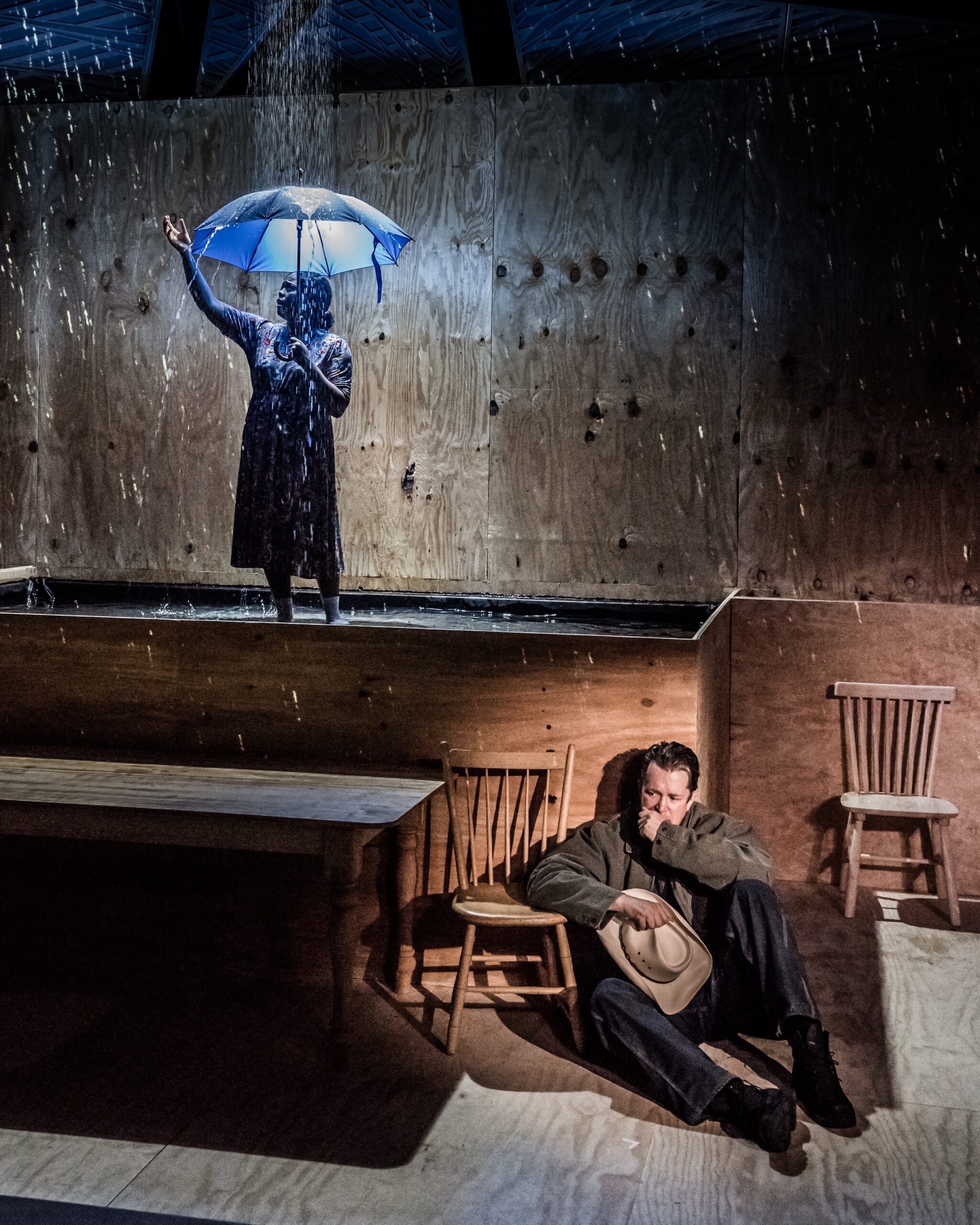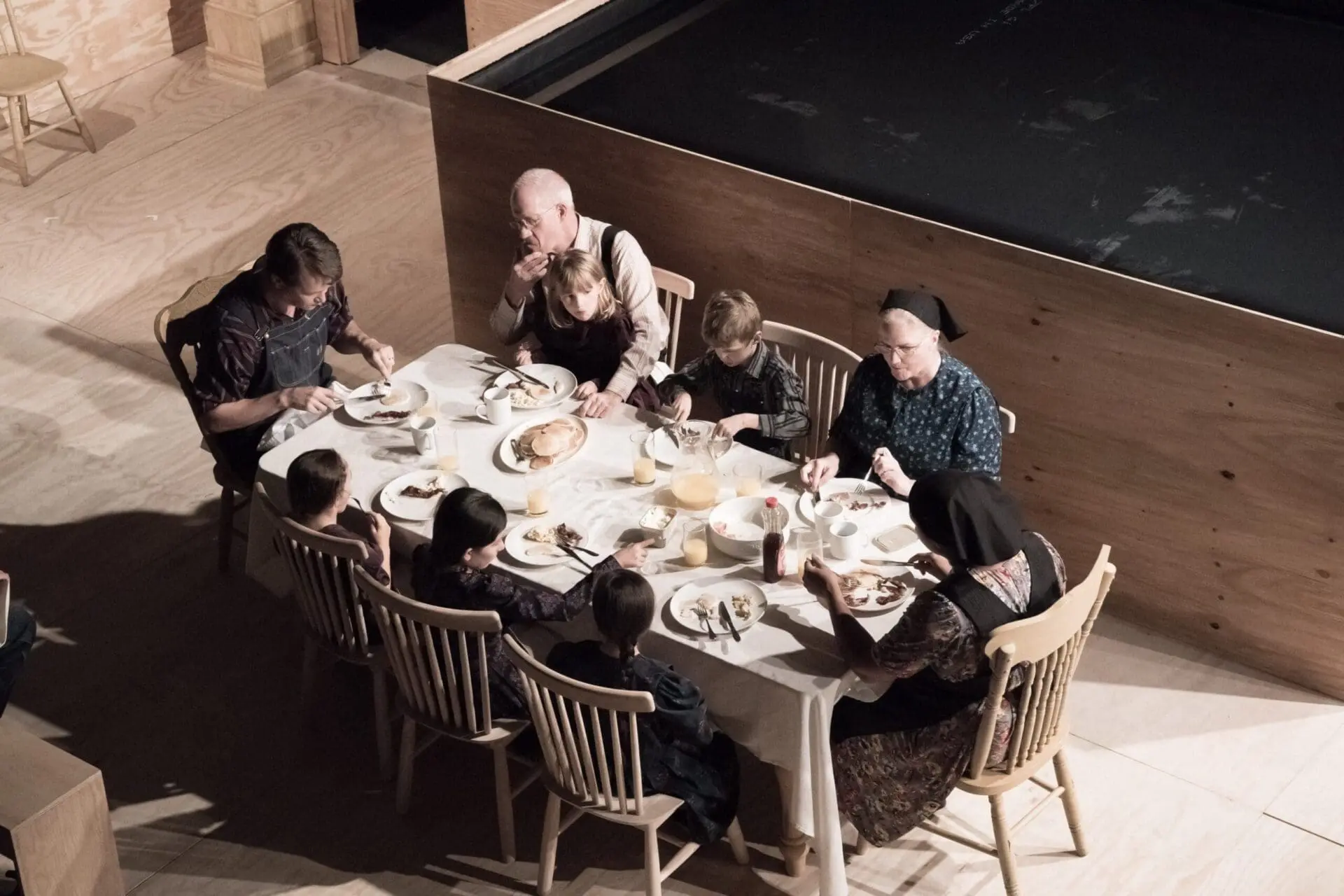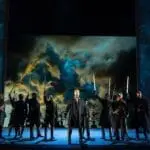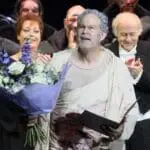The interior of National Sawdust, situated in the heart of Brooklyn’s Williamsburg neighborhood, is, first and foremost, small. Barely 130 people were able to squeeze into the theater for the opening night of the company’s tenth season. However, every one of those 130 people were buzzing, knowing that the production they were about to see was about to take them on an adventure, even if they didn’t quite know what that adventure was.
This is the pedigree that National Sawdust has established since it was first founded by composer Paola Prestini and Kevin Dolan a decade ago. It’s a space that has featured performances by everyone from Joyce DiDonato and Philip Glass to Tanya Tagaq and Missy Mazzoli. Tonight, however, it’s Prestini’s turn to share her work in her own space for the very first time.
That work is Silent Light, the chamber opera she developed alongside the prolific Canadian librettist and erstwhile collaborator Royce Vavrek. Based on the acclaimed film of the same name directed by Carlos Reygadas, the opera was first workshopped in collaboration with the Banff Centre for Arts and Creativity. This presentation features much of the same creative team, including director Thaddeus Strassberger and Canadian bass-baritone Daniel Okulitch in the principal role of Johann.
The most striking thing about Reygadas’s film is, as the title suggests, its silence. The characters – a Mennonite family whose patriarch (played in the opera by Okulitch) is having a passionate affair with Marianne, another woman in town – communicate in short sentences, unsure of how to talk about the uncomfortable subject of infidelity in a tight-knit faith-based community.
Given its stoicism, it was hard to imagine what any opera company – much less one with all the modern sound and light enhancements that National Sawdust has at its disposal – would choose to turn it into an opera. Their solution was to amplify (literally) the action, adding special effects through the art of foley (designed by Sxip Shirey and stunningly executed by Nathan Repasz) and sound effects so loud that your seat literally rumbled and you felt as though the moments of discomfort the sounds highlighted were your own.
Prestini’s instrumental ensemble provides emotional soundscapes and poignant accompaniment, transporting the audience between the complicated life of the characters and the discomfort of the unknown and unspoken. The contrast between the two was highlighted in the gradually built musical mayhem that underscored the climax of Johann and Marianne’s affair. This was followed by a minimalist movement that sets up Johann and Esther’s fateful car ride, ending with Esther dying from (literally) a broken heart – though, perhaps in the only conventional operatic moment in the entire show, not before a standout aria stirringly performed by soprano Brittany Renee. All of these musical colours were confidently captained by Grammy nominee Christopher Rountree, who balanced the need for measured leadership in a challenging score with being the catalyst in its chaotic moments.

Photo Credit: Jill Steinberg
Brittany Renee (Esther) and Daniel Okulitch (Johan) in Silent Light
This was a cast filled with accolades, including tenor Anthony Dean Griffey providing sound voice to perhaps less-than-sound counsel as Johann’s friend Zacharias, and mezzo-soprano Margaret Lattimore as Esther’s mother who was just as noteworthy for her acting arc away from the sung action as she was for the devastating aria she sings as she prepares the white linens that her daughter will be buried in.
Special mention also has to be made of Julia Mintzer, who embodies all of the complexities of being the “other woman,” from unbridled passion for her lover to the ultimate loneliness she feels in the community. Ultimately, Marianne’s most impactful kiss is given to Esther, bringing the deceased wife back to life in a moment that leaves the audience to decide its literality.
The show’s most powerful moment came not from its capable leads, but its chorus. Comprised of members from the Choir of Trinity Church (a co-commissioner of this project), they were kept busy throughout the production. They became an extension of Esther’s physical and emotional suffering, and they donned cow heads and assumed a posture to be milked as Johann asks his father for advice about his dilemma. For their starring moment, however, they were a community in mourning, gathered around Esther’s coffin in her home. Prestini created an exquisite re-voicing of the 19th century hymn “The City of Light” that makes for a haunting dirge. It was made even more moving by the amplified and pitch-modified wind, created by foley, that sounds as though Esther’s spirit (or perhaps the Holy Spirit) rushed through the audience. Rountree joined the mourners on stage to conduct them, songbook in hand, as though he were a song-leader in the congregation, not the conductor of the choir.
Indeed, each member of Silent Light’s opening night audience was a member of that congregation. Seated so intimately close to the stage, each shift in Prestini’s score was arresting. Each character’s journey and struggle, in spite of their stoicism, resonates through the unfamiliar moral turpitude they find themselves in.
And in the midst of the emotional and physical noise, it is the silences that still manage to be the loudest element of all.
Opera Canada depends on the generous contributions of its supporters to bring readers outstanding, in-depth coverage of opera in Canada and beyond. Please consider subscribing or donating today.















